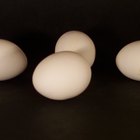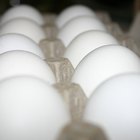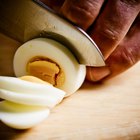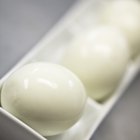
While the typical life span of an egg in your refrigerator should not exceed five weeks, coating eggs in mineral oil can provide you with up to eight months of storage time. Preserve eggs easily at home and be prepared for an emergency; or simply put up an overabundance of eggs for later use.
Egg-Preserving Basics
Mineral oil works as a protective coating that prevents eggs from picking up odors as well as slowing the deterioration and drying of the egg during long-term storage. For the best results, eggs should be dipped in mineral oil within 24 hours of being laid, making this method ineffective for store-bought eggs. Use only clean, unfertilized eggs for long-term storage. Eggs should not be washed before storing, as this removes the egg's natural bloom, a protective coating which helps prevent bacteria from entering the egg. For eggs that require cleaning, do not use this method of preservation.
Coating Your Eggs
To preserve eggs for storage using this method, you do not need to heat the mineral oil before use. Submerge fresh, dry eggs at room temperature into the mineral oil using a wire basket to preserve many at a time, or individually using a spoon or ladle. Remove the eggs and allow them to drain briefly on a rack to remove the excess oil. Place the eggs in a carton or case with the small side down to protect the larger side's air cell.
Storing Preserved Eggs
While room temperature storage is possible using this method, you will recognize better long-term storage using cooler temperatures. Store cartons or cases of eggs in a cool location such as a basement, ensuring that you do not subject them to freezing temperatures in a completely unheated storage area. Keep eggs in storage until ready to use, but do not exceed eight months, as undesirable odors and flavors will develop in the egg beyond this time.
Egg Storage Tips
When using preserved eggs, be sure to cook them thoroughly and practice good food safety and handling hygiene. While incidence of spoilage is low when using this method, as with any food item, it is possible. Spoiled eggs produce a strong sulfur smell that will be immediately discernible upon cracking the shell; discard any spoiled eggs without cooking. Once oiled, eggs are not suitable for making cakes and whipping, as the oil interferes with the foaming ability of the egg's white.
Related Articles

How to Freeze Raw Eggs

How to Boil Organic Eggs

Shelf Life of Hard Boiled Eggs
How Long Before a Hard Boiled Egg Goes ...

How Do I Freeze Egg Beaters?

How to Make Peanut Butter Easter Eggs

How to Store Egg Whites

How to Preserve a Hard Boiled Egg

How to Store Cracked Eggs in ...

Can You Hard Boil a Broken Egg?
How Long After I Cook Hard-Boiled Eggs ...

How to Make Powdered Eggs
How Much Does it Cost to Freeze Your ...

How to Cook Eggs Sunny Side Up Without ...

Can You Eat Hard-Boiled Eggs Even ...

How to Make Salted Egg

How to Cook Salmon Roe
Can Deviled Eggs Be Prepared Two Days ...

How to Make Glow in the Dark Eggs

Can You Eat a Broken Egg?
References
Writer Bio
Based in Portland, Ore., Maxine Wallace is a writer with more than 12 years of experience. With a bachelor's degree in journalism and experience working on marketing campaigns for large media agencies, she is well-versed in multiple industries including the Internet, cooking, gardening, health, fitness, travel and holistic living.
Photo Credits
Ablestock.com/AbleStock.com/Getty Images